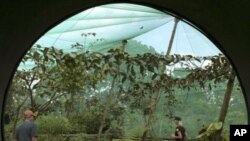Human activities are causing a profound loss of diversity on earth according to scientists at a two-day summit in London. The meet comes as representatives from almost 200 countries are in Japan for a UN summit on biodiversity aimed at limiting the loss of habitats and species.
Biologist Maria Dornelas, of Britain's University of St. Andrews, is one of the experts taking part in a two-day conference at London's Royal Society.
VOA asked her to sum up the driving theme of the conference.
"We are transforming the landscapes, we are exploiting resources and in doing so we are profoundly altering the planet," said Dornelas.
A recent report published by the International Union for Conservation of Nature studied 25,000 of the world's species and found that one-fifth of them are threatened with extinction.
It said every year 50 species of mammals, birds, and amphibians move closer to extinction.
David Thomas is from the conservation group Birdlife. He says the plants and animals that could be wiped out are at the heart of everyday life.
"Biodiversity is food, biodiversity is the fabric and the clothes that we wear, biodiversity is what cleans the air and absorbs carbon dioxide, biodiversity is the source of many, many of the world's medicines," said Thomas. "Biodiversity really is just fundamental to existence."
Delegates at a U.N. summit in the Japanese city Nagoya have been working on a 20-point plan on protecting nature. The aim is to preserve habitats and restore fragile ecosystems.
Environmental groups want to see 20 percent of coastal and marine areas protected.
Another focus of the summit is genetic resources and how their benefits can be fairly shared. Developing countries say wealthy nations and major corporations should not be able to develop drugs, cosmetics, and other products using the genetic resources of the developing nation without compensation.
Thomas says it is the world's poorest people who rely most on biodiversity.
"If you live in a rural area in Africa and you rely on a particular water source or a particular area of forest for medicines or fuel woods or food, if that resource disappears then you do not have alternatives to turn to, your options are very, very limited," he said.
Earlier this week, the U.N. Food and Agriculture Association published a report on the state of the world's plant genetic resources.
It said an industrial focus on a few major crops has meant that 75 percent of crop diversity was lost between the year 1900 and 2000.
And, it said, climate change means many more will be lost in the coming decades.
Namanga Ngongi, the president of the Alliance for a Green Revolution in Africa, says biodiversity is key to agriculture in Africa, especially as new seed varieties will be needed as the world heats up.
"Rare habitats in which you have rare plants and rare animals, are being cleared mostly for agriculture," he said. "So we have to find a way to increase productivity on existing land so that we can save the land that is not yet put into agriculture."
Seventeen "mega-diverse" countries including Brazil, Kenya, and China are home to 70 percent of the planet's species.
The 12-day U.N. Summit in Japan ends Friday.




